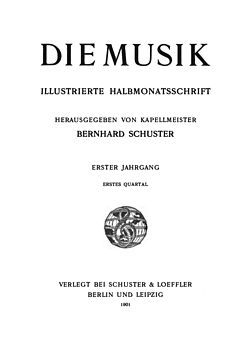Die Musik
 |
|
| Editor | Bernhard Schuster |
|---|---|
| Categories | Music magazine |
| Frequency | Semimonthly |
| First issue | January 1, 1901 |
| Final issue | February 1943 |
| Company | Schuster & Loeffler Deutsche Verlags-Anstalt |
| Country | Germany |
| Based in | Berlin |
| Language | German |
Die Musik was a German music magazine established in 1901 by Bernhard Schuster (1870–1934). It was published semimonthly by Schuster & Loeffler from Berlin and Leipzig. Schuster was its editor-in-chief from inception until July 1933, when the publication was taken over by the Third Reich. The final publication, under the name Die Musik, was February 1943.
First published in 1901, Die Musik ran semimonthly through September 1915, suspended publication due to World War I. In 1922, the publisher, Schuster & Loeffler, merged with the Stuttgart firm Deutsche Verlags-Anstalt ; and in October 1922, Die Musik (Vol. 25, Issue 1) resumed with Schuster as editor. A leaflet attached to the June 1933 issue marked its beginning as the official music journal of the Nazi Party. The publication continued through 1943, changing its name in 1943 to Musik im Kriege (Music in War) and continued through 1944.
Die Musik was the first German magazine to publish special issues called "Sonderhefte" — Wagner-Heft, February 1902. By 1932, Die Musik had published 120 special issues. Schuster stated that the 14 Beethoven and 15 Wagner issues equated to 8 to 10 yearbooks.
According to essayist Stephen W. Brown, Die Musik was the most successful music periodical in Germany because it targeted readership, from laypeople, to musicians, to scholars. Brown commented that Die Musik was remarkable for its variety and attention to jazz, but was silenced for political reasons in 1934. Its importance in musicology is significant, especially considering, according to Brown, that the dominant periodicals for musicology of that era were German.
According to the thesis of book by Erik Levi — Mozart and the Nazis: How the Third Reich Abused a Cultural Icon — the Third Reich embraced the artistic heritage as its domain. Because Die Musik was the most prestigious German-language music magazine of the first half of the twentieth century, the Third Reich took a special interest in requisitioned as the offician bulletin of the RJF.
In its new role, Die Musik spearheaded several Nazi initiatives, including one called "Organ des Amtes für Kunstpflege beim Beauftragten des Führers für die gesamte geistige und weltanschauliche Schulung der NSDAP", commonly known as "Amt Rosenberg".
...
Wikipedia
